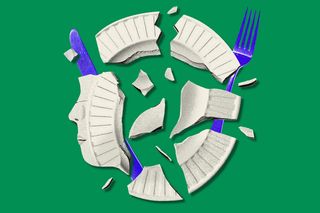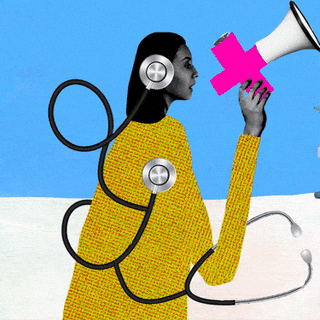
The Difference Between an Eating Disorder and Disordered Eating, Explained
Even though their eating habits might not be reshaping their lives, disordered eating does come with its own set of struggles.

Society’s toxic relationship with food — peddled by diet culture — has made eating disorders and disordered eating habits a tragic fixture of the lives of many individuals. Coupled with our existence in an age where pop psychology on social media often replaces facts and data-based insights, the terms “eating disorder” and “disordered eating” are beginning to be used interchangeably.
On the one hand, the awareness of mental health in the digital age has, undoubtedly, helped people recognize disordered eating behaviors, and on occasion, inspired them to work on bettering their relationship with food. On the other hand, however, the conflation of one’s broken relationship with food with a very serious, very fatal mental health condition like an eating disorder simply adds to the pandemic-spawned infodemic around health and wellness.
But, often, their symptoms are so alike that it can be challenging for a non-professional to tell the two apart. Both eating disorders and disordered eating share a multitude of symptoms like binge eating, feeling out of control around food, unhealthy ways to control one’s weight resulting in frequent fluctuations in the weight, and, most importantly, a distorted body image. So, it’s not really people’s fault for mixing up the two. But consulting an expert before zeroing in on an eating disorder diagnosis based solely on internet research, might be a good idea here.
“When someone’s eating patterns take them away from normal functioning, this can be a strong indication of an eating disorder,” explains Temimah Zucker, a therapist who has struggled with an eating disorder herself. “This can include a woman who will not go out with friends because of the fears around their judgment while she eats. Or perhaps an individual does not attend work or school on more than one occasion due to behavior use like a compulsion to exercise. While these examples may sound extreme, those struggling often cite impairments of their social functioning as well as other obligations, due to their eating disorders.”
Related on The Swaddle:
For People With Poor Impulse Control, Instant Food Delivery Apps Can Kickstart Disordered Eating
Unlike an eating disorder, disordered eating isn’t recognized as a mental health condition according to the Diagnostic and Statistical Manual of Mental Health Disorders. Disordered eating behaviors — essentially, food habits governed by factors other than hunger and nutrition — are estimated to affect 50% of the population. Only 9% of the global population, however, is reported to be struggling with different clinical eating disorders.
In other words, while struggling with disordered eating can lead an individual to obsess about what they’re eating and how it’s impacting their body, their preoccupation with food doesn’t impact their lives as much as having an eating disorder does — due to the consistency and severity of the fixation among the latter set, as well as the impact on their overall health. Zucker explains that the obsession with food in an eating disorder can be “all-consuming,” and “impair focus, the ability to stay present, and sleep, among other things.”
“There’s a fine line between disordered eating and an eating disorder. Disordered eating is generally mild without a significant impact on someone’s mental or physical health or self-worth,” notes Dr. Katherine Hill, an eating disorder specialist. “[G]enerally, people with disordered eating aren’t struggling with common medical or psychiatric complications of an eating disorder, like mood changes, menstrual irregularities, [gastrointestinal] symptoms, bone density, or changes to heart function.”
Even though their eating habits might not be reshaping their lives, disordered eating does come with its own set of struggles — ranging from anxiety around trying new foods to guilt-driven compensation over having eaten more than planned to skipping meals, crash dieting, and even secretly snacking. These experiences may not uproot one’s life, but they certainly disrupt one’s emotional wellbeing — showing how a fractured relationship with sustenance can interfere with one’s quality of life.
Related on The Swaddle:
Is This Normal? ‘I Don’t Like to Eat in Front of Other People’
Moreover, Zucker mentions that disordered eating habits can, eventually, assume the form of a diagnosable eating disorder — highlighting why it’s important not to take disordered eating lightly. She clarifies that it’s not necessary for every instance of disordered eating to morph into a full-blown disorder, but emphasizes the importance of seeking help — from dieticians, nutritionists, or therapists, to work on their relationship with food — as soon as one realizes something is off there.
It is also pertinent to note, though, that what might appear as disordered eating to an external observer, might actually be an eating disorder. “People are often very skilled at hiding their eating disorder, and it might initially appear [milder] than it actually is. Parents and caregivers are often shocked to learn not only that their child has an eating disorder, but that the eating disorder has been going on for a while without anybody knowing,” Dr. Hill, who is also a pediatrician, points out.
Society’s obsession with having the perfect — by which, we mean, “impossible” — physique, is at the root of the troubled relationship people develop with food, be it in the form of an eating disorder, or disordered eating habits. When the idea of beauty begins to come at the cost of jeopardizing our health, though, we know it’s time to pull the brakes on diet culture. Yet, instead of deeming our culture’s preoccupation with unhealthy and unrealistic ideals as abnormal, and working to repair them, we deem people’s perfectly natural reaction to this toxicity — manifesting as the erosion of trust in our bodies, and an inclination to disregard its needs — as an anomaly.
Until we, as a society, learn to truly — and not just as performative body positivity — celebrate the fact that beauty comes in an assortment of shapes and sizes and there’s no one-image-fits-all when it comes to good health, it’s unlikely that the prevalence of either eating disorders or disordered eating will decline.
Devrupa Rakshit is an Associate Editor at The Swaddle. She is a lawyer by education, a poet by accident, a painter by shaukh, and autistic by birth. You can find her on Instagram @devruparakshit.
Related


Why Whodunnit Satires Are Replacing Murder Mysteries
